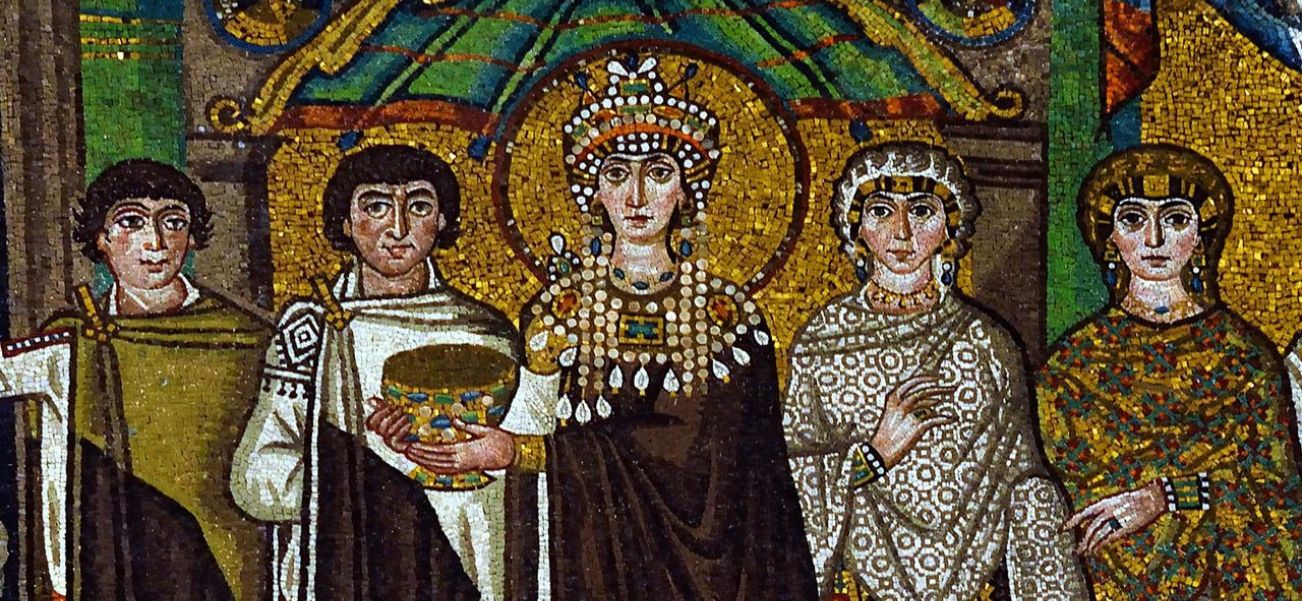
Empress Theodora: The Most Powerful Woman in Byzantine History
In the long, turbulent annals of the Byzantine Empire, a realm that spanned a millennium and served as the bulwark of Christendom for centuries, few figures command attention like Empress Theodora. Her story is one of the most dramatic reversals of fortune ever recorded: from the scandalous depths of the theatre and brothels of Constantinople to the sacred pinnacle of the Imperial Purple.
More than just a rags-to-riches tale, Theodora’s life is a testament to extraordinary intelligence, ruthless political acumen, and an iron will that shaped the destiny of an empire. She was not merely the wife of Emperor Justinian I; she was his partner in every sense of the word—co-ruler, chief advisor, and saviour. In an age when women were largely confined to the private sphere, Theodora wielded power openly and decisively, earning her rightful place as the most powerful woman in Byzantine history.
EMPRESS THEODORA: FROM ACTRESS TO BYZANTINE EMPRESS - A RISE TO POWER
The Byzantine Empire: The Legacy of Istanbul’s Glory
Part I: The Shadowy Past – From the Hippodrome to the Palace

To understand the magnitude of Theodora’s ascent, one must first appreciate the chasm she crossed. Our primary, albeit deeply biased, source for her early life is Procopius of Caesarea, the court historian for Justinian.
In his public work, "The Buildings", he praises her piety and virtue. But in his secret, salacious chronicle, "The Secret History", he paints a portrait of such lurid depravity that it has fascinated and horrified readers for centuries. While "The Secret History" is undoubtedly exaggerated propaganda, it provides a framework for her humble and disreputable origins.
Theodora was born around the year 500 AD into the lowest strata of Constantinopolitan society. Her father, Acacius, was a bear-keeper for the Green faction of the Hippodrome—the vast chariot-racing stadium that was the heart of the city’s social and political life.
The Hippodrome was more than an arena; it was the pulpit of public opinion, where the populace could cheer their emperor or riot for his overthrow. The four factions—the Blues, Greens, Reds, and Whites—were powerful socio-political gangs, with the Blues and Greens being the most prominent.

After her father’s death, Theodora’s mother, desperate to provide for her three young daughters, brought them to the Hippodrome, presenting them as supplicants to the factions, begging that the father’s position be given to a new stepfather. The Greens, perhaps out of cruelty or indifference, rejected them. The Blues, seeing an opportunity, took them in. This early lesson in the fickleness of power and the importance of patronage would stay with Theodora for life.
With no other means of support, Theodora, like her older sister Comito, was pushed into the world of the stage. In the 6th century, an "actress" ("scenica") was a euphemism for a prostitute. The theatre was a place of low repute, and its performers were legally and socially little better than slaves, denied many rights of ordinary citizens.
Procopius revels in describing Theodora’s notorious performances, her lack of modesty, and her numerous lovers. She traveled through North Africa as the mistress of a Syrian official, Hecebolus, and after he cast her out, she allegedly made her way back to Constantinople via Alexandria.
Hürrem Sultan: From Slave to Ottoman Empress
It was in Alexandria, a melting pot of ideas and religions, that Theodora’s life took its pivotal turn. She underwent a profound religious conversion. Abandoning her former life, she embraced Monophysitism, a Christian doctrine that held that Christ had a single, divine nature, in opposition to the Chalcedonian doctrine of two natures (divine and human) officially upheld in Constantinople.

This faith was not a private whim; it became a core tenet of her political identity, connecting her to the vast populations of Syria and Egypt, who were largely Monophysite. She returned to Constantinople a changed woman, settling in a small house, spinning wool, and seeking a quiet, pious life.
But destiny, in the form of the empire’s most eligible bachelor, intervened. Justinian, the nephew and heir-apparent of the aging Emperor Justin I, was a man of immense ambition, intellect, and energy. He encountered Theodora, and by all accounts, fell passionately in love. She was not a conventional beauty—Procopius describes her as small, pale, and sharp-featured—but she possessed a dazzling wit, a commanding presence, and a formidable intelligence that captivated him.
Their union faced an immense obstacle: an old Roman law, the "Julian Law of Adultery", prevented a member of the senatorial class from marrying an actress. Justinian’s love and Theodora’s ambition would not be denied. He persuaded his uncle, Emperor Justin, to repeal the ancient law, replacing it with new legislation that allowed reformed actresses who had abandoned their former lives to marry whomever they wished.
In 525 AD, Theodora married Justinian. When Justin died in 527, Justinian ascended the throne, and in an unprecedented move, he crowned Theodora not merely as his empress, but as his "Augusta"—a full co-ruler. The bear-keeper’s daughter from the Hippodrome now sat beside the emperor on the Byzantine throne.

Part II: The Throne of Power – Co-Ruler in Fact and Deed
From the moment of her coronation, Theodora was no ordinary empress. Justinian did not relegate her to the women’s quarters ("gynaikeion"); he integrated her into the very machinery of government. She possessed her own imperial seal, received foreign ambassadors in her own right, and corresponded with kings and bishops. She had her own court, staff, and a significant independent income, which she used to build a powerful network of clients and spies.
Her name appeared alongside Justinian’s in official decrees, and her image was stamped on Byzantine coinage, often depicting her with the same imperial regalia as her husband.
St. Nicholas of Myra (Antalya): From Bishop to Santa Claus
Her influence was felt across all spheres of policy:
1. Religious Policy: The Monophysite Champion
Theodora’s most consistent and impactful influence was in the realm of religion. Justinian was a staunch Chalcedonian, dreaming of a unified, orthodox empire. Theodora, however, remained a devoted and cunning protector of the Monophysites. This was not a source of conflict but a brilliant division of labour.

While Justinian publicly enforced orthodoxy, Theodora provided a safety valve. She offered sanctuary to persecuted Monophysite bishops in the Hormisdas Palace, her personal residence across from the Imperial Palace. She appointed a Monophysite bishop in the capital itself and engineered the appointment of Pope Theodosius in Alexandria.
Her most audacious act was to secretly sponsor a mission of Monophysite monks, led by Julian, to proselytize in Nubia (modern Sudan). This mission successfully converted the kingdoms of Nobatia and Alodia to Monophysite Christianity, creating a lasting Christian legacy in Africa that outlasted the empire itself.
By protecting the Monophysites, Theodora prevented the religious alienation of the vital eastern provinces of Syria and Egypt for a crucial period, arguably delaying their eventual loss to the Islamic armies a century later. She understood that theological rigidity could shatter an empire, and she acted as a pragmatic, if covert, force for stability.
2. Legal and Social Reforms: A Voice for the Defenseless
Theodora used her immense influence to enact sweeping legal reforms that improved the status of women and protected the vulnerable. Drawing from her own harrowing past, she possessed a unique empathy for those on the margins of society.
Justinian’s great legal codification, the "Corpus Juris Civilis", bears the mark of Theodora’s advocacy. New laws were passed that were revolutionary for their time:
- Rights for Actresses and Prostitutes Laws were enacted to ban forced prostitution. Brothels were closed down, and former prostitutes were provided with shelter and support in a converted palace on the Asian side of the Bosphorus, offering them a chance at a new life.
- Expanded Divorce and Property Rights Theodora pushed for laws that granted women greater rights in divorce and inheritance. A wife could now divorce her husband if he was convicted of treason or murder, and mothers were given greater rights of guardianship over their children.
- Protection against Pimping Harsh penalties were established for pimps and for anyone who kidnapped women for the sex trade.
These reforms were not merely charitable; they were a profound assertion of the state’s responsibility toward its most powerless citizens, a concept largely alien to the ancient world. They reflected Theodora’s lived experience and her determination to use absolute power to rectify the injustices she had witnessed.
Part III: The Crucible – The Nika Revolt and the Salvation of an Empire
The true measure of Theodora’s greatness, and the moment that cemented her legacy as a co-ruler in fact as well as name, came during the Nika Revolt of January 532 AD. This event was the single greatest crisis of Justinian’s reign, and it was Theodora who single-handedly saved it.
The revolt began, as so often, in the Hippodrome. The rival factions of the Blues and Greens, usually at each other’s throats, united in their fury against Justinian’s government, particularly his tax collectors. The cry "Nika!" ("Conquer!") echoed through the streets as the mob erupted, burning large swathes of Constantinople, including the original Hagia Sophia church, and proclaiming a new emperor, Hypatius.
For five days, the city was in flames and anarchy reigned. Justinian’s advisors were in a state of panic. Trapped in the palace, with the treasury nearly empty and loyal troops few, the emperor and his council debated their options. The prevailing opinion, voiced by his closest ministers, was to flee. They could load the imperial treasure onto ships and escape to a safe haven, perhaps in Heraclea, to fight another day.
Justinian, despairing and overwhelmed, was inclined to agree. It was at this moment of absolute despair that Theodora rose to speak. Her speech, as recorded by Procopius in his "Wars", is one of the most famous and resolute in history. She silenced the council of terrified men with her words:
"My lords, the present occasion is too serious to allow me to follow the convention that a woman should not speak in a man's council. Those whose interests are threatened by extreme danger should think only of the wisest course of action, not of conventions."
"In my opinion, flight is not the right course, even if it should bring us to safety. It is impossible for a person, having been born into this world, not to die, but for one who has reigned it is intolerable to be a fugitive. May I never be deprived of this purple robe, and may I never see the day when those who meet me do not call me empress."
"If you wish to save yourself, my lord, that is easy. We are rich; over there is the sea, and yonder are the ships. Yet reflect for a moment whether, when you have once escaped to a place of security, you would not gladly exchange such safety for death. As for me, I agree with the adage that the royal purple is the noblest shroud."
The effect was electric. Her courage shamed the men in the room and galvanized their resolve. She had reframed the entire situation: death with honour as a ruler was preferable to life as a disgraced fugitive. Her words "the royal purple is the noblest shroud" became a legendary expression of sovereign duty.
Inspired by his wife’s unwavering fortitude, Justinian regained his nerve. He devised a plan of brutal realpolitik. His two most trusted generals, Belisarius and Mundus, along with the eunuch treasurer Narses, were sent into the Hippodrome, where the rioters were gathered to crown Hypatius. Narses, armed with a bag of gold, went to the Blues’ section, reminding them of Justinian’s past favours and their traditional rivalry with the Greens.
As doubt and division sowed confusion among the rebels, Belisarius and Mundus led their loyal troops into the stadium and sealed the exits. What followed was not a battle but a massacre. Over 30,000 rebels were slaughtered in the Hippodrome. Hypatius was executed, and the revolt was crushed in a single, bloody day.
The Nika Revolt was a turning point. Justinian’s power was now absolute and unchallenged. And it was Theodora who had given him that power. She had not offered comforting words; she had provided the essential, steely leadership that he, in his moment of crisis, lacked.
From that day forward, her position was unassailable. Justinian knew, and the entire court knew, that he owed his throne to her. She was truly an empress who had earned her crown not by birth, but by merit and sheer force of will.
Part IV: The Imperial Legacy – Building a Christian Empire
In the aftermath of Nika, Justinian and Theodora embarked on an unprecedented rebuilding program. The charred centre of Constantinople was transformed into the most magnificent city in the Christian world. The greatest testament to this is the Hagia Sophia, the Church of the Holy Wisdom. Rebuilt in just five years, its revolutionary dome was said to be suspended from heaven by a golden chain. It remained the largest cathedral in Christendom for a thousand years.
Theodora was a full partner in this building campaign. Her presence is immortalized in the brilliant mosaics of the Basilica of San Vitale in Ravenna, which Byzantine forces reconquered during her lifetime. While one panel shows Justinian with his court and clergy, the facing panel depicts Theodora, equally central and majestic.
She is portrayed not as a demure consort, but as an imperial equal, holding a chalice, accompanied by her own court of ladies and eunuchs. The mosaic captures her profound, almost otherworldly authority, her eyes holding a gaze as commanding as any emperor’s.
Until her death from cancer (possibly breast cancer) in 548 AD, Theodora remained the most powerful figure in the empire beside her husband. Her passing left a void that Justinian never filled. He became increasingly withdrawn and his later years lacked the dynamism and purpose that had characterized the first half of his reign. He continued to rule for another seventeen years, but the great partnership that had defined an era was over.
Conclusion: The Indelible Mark of a Empress
Empress Theodora’s legacy is complex and multifaceted. To her detractors, both ancient and modern, she was a scheming, vengeful woman of low morals who never shook off the prejudices of her birth. She could indeed be ruthless, orchestrating the downfall of officials who crossed her, including the brilliant but arrogant John the Cappadocian, whom she had forcibly tonsured and exiled to a monastery.
Yet, to judge her by the standards of her sex and background is to miss the point entirely. Theodora shattered every constraint placed upon her. She rose from a position of utter powerlessness to become the co-architect of the Byzantine Golden Age. She was a master of realpolitik, a social reformer, a religious maverick, and, in the empire’s darkest hour, its saviour.
Her influence shaped the very fabric of the law, the religious landscape of the East, and the skyline of Constantinople. She demonstrated that power, regardless of its origin, could be wielded with intelligence, compassion for the powerless, and unyielding courage. In a world that sought to define and limit her, Theodora defined herself. She was not just the most powerful woman in Byzantine history; she was one of its most formidable and transformative rulers, a sovereign who truly earned her purple and whose extraordinary story continues to resonate across the centuries.














